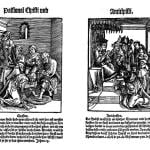Angels are not just private messengers, they are also public testifiers. Michael Heiser rightly points to the plurals in Is. 40.1-2– where the exhortation to comfort– is addressed to members of the divine council to go and comfort God’s people (p. 41). Jer. 23.16-22 is interesting because it refers to real earthly prophets standing in the divine council and listening to the discussion and then going and proclaiming God’s Word. Angels may do this… but so may human prophets. Why does ‘the Satan’ (not a personal name) in Job 1-2 report to the divine council and receive a commission? Because it is the task force for governing the world (pp. 42-46).
But we must turn now to Heiser’s all important discussion of the malak Yahweh. In The Unseen Realmpp. 127-47 Michael had already argued at length that the ‘malak Yahweh’ is none other than Yahweh himself in visible form. This I think is a possible conclusion based on the relevant OT texts, but not a necessary one. It is also possible that the concept of a special agent is involved– a particular angel. This concept of a shaliach, is a well known one in OT, early Jewish and NT times, and there is even sayings like ‘a man’s agent is as himself’. He is to be treated as the one who sent him, and he speaks both for the one who sent him, and with the authority of the one who sent him, and further– basically he speaks as the one who sent him. He is the sender’s messenger. Now Michael’s approach to this issue is complex– it has to do with OT Name theology, it also has to do with the later Jewish two powers in heaven theology. Now good scholars can differ on this one, but to be clear about my own view: 1) while I think it is possible to see the angel of the Lord as Yahweh manifesting himself, as a NT scholar I am leery of this because as the book of Hebrews says— the Son of God is no angel, he is in a separate category about the angels. In short he is part of the divine identity. If the term ‘malak’ has any ontological freight at all in its use in the phrase malak Yahweh, then it does not mean the visible form of Yahweh, it means the messenger or agent of Yahweh; 2) I am even less convinced that the angel of the Lord is the Son of God in disguise. This is part of what the author of Hebrews (not to mention Colossians) is denying. In short there was no incarnation of the Son before what happened in Mary’s womb. Period. 3) if one wants to find where or how the Son was involved in OT times, then one needs to follow the lead of Paul in 1 Cor. 10 where he tells us that the one previously called God’s Wisdom (see Prov. 3, 8-9; Wis. Sol. 10-17; Sirach; 1 Enoch 42) was in fact the Son of God involved in helping Israel. Now Wisdom in none of these texts assumes a bodily form. Wisdom is simply a behind the scenes influencer.

















